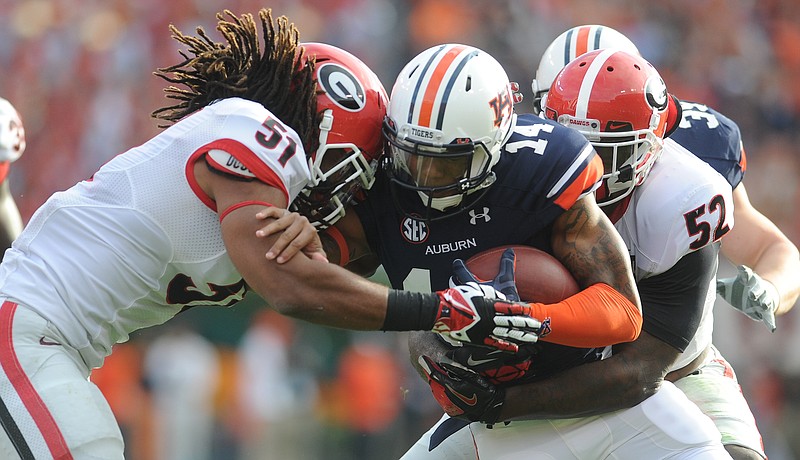For more than 50 football seasons, Georgia would play its last big game in Sanford Stadium against either Auburn or Georgia Tech, depending on whether it was an odd- or even-numbered year.
That changed in 2013, when Auburn and Georgia accommodated the Southeastern Conference's new scheduling format that resulted from the 2012 additions of Missouri and Texas A&M. The Tigers and Bulldogs collided in Auburn's Jordan-Hare Stadium for a second consecutive year in 2013, and the two programs have since adjusted to playing their biggest November games either both at home or both on the road.
Georgia had to play at Auburn and at Georgia Tech last season, while Auburn must play at Georgia and at Alabama this year.
"I would absolutely love to get a chance to fix that and return the favor we paid them," Georgia third-year coach Kirby Smart said Tuesday afternoon in a news conference as the SEC spring meetings opened in Destin, Florida. "I hear about that a lot. Obviously, I wasn't here, but I think it can make it more consistent and can balance things out.
"It would probably be helpful in the long run, but I get the feeling there is more to it than just us and them. It always affects so many moving parts, but it would be nice if we could do that."
Georgia and Auburn have the oldest rivalry in the SEC, with the Bulldogs holding a 58-56-8 edge through 122 encounters. The Tigers won 40-17 last November to pull within one game in the series, but the Bulldogs avenged that setback three weeks later with a 28-7 triumph in the SEC title game.
Auburn coach Gus Malzahn told Birmingham's WJOX earlier this month that he liked it better when the Tigers hosted Georgia and Alabama in separate seasons.
"I think the big thing is having them staggered - one at home and one away would probably be the best for those two at the end," Malzahn said. "Last year it was two at home, and this year it's two away. If you look back at 2010, we played Georgia at home and played Alabama away.
"That would be my wish."
To assist the SEC's 6-1-1 scheduling format consisting of six contests against division foes, one game against a permanent cross-division rival and one game against a rotating cross-division foe, the league needed three matchups to be held at the same locale in 2012 and 2013. In addition to Georgia and Auburn playing twice in a row in Auburn, Alabama and Ole Miss met back-to-back years in Tuscaloosa and Ole Miss and Texas A&M met back-to-back in Oxford.
The league implemented a cross-divisional rotating schedule in 2014 that will be in place until 2025, which makes the shared desire of Georgia and Auburn to revert back to yesteryear more of a pipe dream.
"If you were going to undo it, then you would have the same dynamic you had back when they joined the conference," Georgia athletic director Greg McGarity told reporters Tuesday. "You would have to go back and adjust things for the vast majority of the schools. The decision was made to impact the fewest amount of teams, and we were one of those."
'Why is it on me?'
Alabama football coach Nick Saban has found himself again in the center of the SEC's policy regarding graduate transfers within the league.
Former Crimson Tide offensive lineman Brandon Kennedy is wanting to transfer to Auburn or Tennessee, but the league currently calls for graduate transfers to sit out a year when moving from one SEC school to another unless the original school approves it. Former Alabama safety Maurice Smith was granted a waiver by the league in 2016 to transfer and become eligible immediately at Georgia.
"If we agree in the SEC at these meetings that we're going to have free agency in our league and everybody can go wherever they want to go when they graduate and that's what's best for the game, then that's what we should do," Saban said in a news conference. "Then Brandon Kennedy can go wherever he wants to go, but if we don't do that, then why is it on me? We have a conference rule that says he can't do it.
"He can do it, but he's supposed to sit out a year."
Saban added that Alabama would benefit more than other schools by changing the rule but that he's not for the change. Other league coaches, including some former Saban assistants, would like to see graduate transfers immediately eligible at their second SEC locale.
"If somebody graduates, to me they've kind of fulfilled their obligation," new Tennessee coach Jeremy Pruitt told reporters.
Reduced headsets
Saban is not a fan of the recent NCAA rule limiting teams to 20 headsets during games.
Under the change, the head coach, assistants and graduate assistants are allowed on headsets during a game, along with four players and another staffer who has a noncoaching role, such as charting plays.
"I don't know who is driving all this stuff," he said, "but to me it's kind of like mouse manure when you're up to your ears in elephant doo doo."
Contact David Paschall at dpaschall@timesfreepress.com or 423-757-6524.
